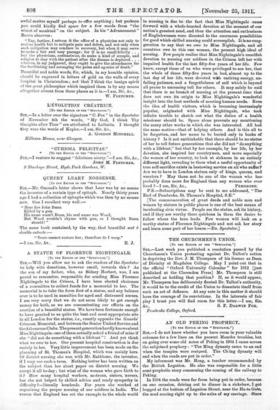A STATUE OF FLORENCE NIGHTINGALE.
[TO THE EDITOR OF THE "SPECTATOR."]
SIR,—Will you allow me to ask the readers of the Spectator to help with donations, however small, towards this ? As the son of my father, who, as Sidney _Herbert, was, I am preirid to remember, responsible for sending Miss Florence Nightingale to the Crimea, I have been elected chairman of a committee to collect funds for a memorial to her. The memorial is to take the form first of a statue, and any balance over is to be used in annuities for aged and distressed nurses. I am very sorry that we do not seem likely to get enough money for both, so we are concentrating our efforts on the erection of a beautiful statue. We have been fortunate enough to have granted to us quite the best and most appropriate site in all London for the statue, i.e.i exactly opposite the Guards' Crimean Memorial, and between the Senior United Service and theAthenteum Clubs. Thepresent generation hardly knows about Miss Nightingale: one of them actually asked a friend of mine if she "did not do something with a lifeboat "! And yet think what we owe to her. Our present hospital construction is due mainly to her. Very little improvement has been made on the planning of St. Thomas's Hospital, which was mainly hers. Of district nursing she was, with Mr. Rathbone, the inventor, if I may use such a-term. Nothing better has been written on the subject than her short paper on district nursing. We accept it all to-day ; but what of the woman who gave birth to it ? How many hospital workers, matrons, sisters, -nurses, has she not helped by skilled advice and ready sympathy in difficulty P—literally hundreds. For years she worked at organizing the proper nursing of our soldiers in India. The reason that England has set the example to the whole world in nursing is due to the fact that Miss Nightingale came forward with a whole-hearted devotion at the moment of our nation's greatest need, and thus the attention and enthusiasm of Englishwomen were directed to the enormous possibilities for good which skilled nursing could accomplish. It is no exag- geration to say that we owe to Miss Nightingale, and all countries owe to this one woman, the present high ideal of nursing. Few people realize that Miss Nightingale's unselfish devotion to nursing our soldiers in the. Crimea left her with impaired health for the last fifty-five years of her life. Few know, except those of us who were privileged to see her, that the whole of those fifty-five years in bed, almost up to the last day of her life, were devoted with untiring energy, un- failing patience, and a forgetfulness of self which is beyond all praise to unceasing toil for others. It may safely be said that there is no branch of nursing at the present time that does not owe its origin to Miss Nightingale's wonderful insight into the best methods of meeting human needs. Even the idea of health visitors, which is becoming increasingly popular, originated with Miss Nightingale, who took infinite trouble to sketch out what the duties of a health missioner should. be. Space alone prevents my mentioning the many other works in which she was interested. All had the same motive—that of helping others. And is this all to be forgotten, and her name to be buried only in books of history ? Is it not unthinkable that there should be no statue of her to tell future generations that she did not " do anything with a lifeboat," but that by her example, by her life, by her devotion, she inspired her countrymen, and more especially the women of her country, to look at sickness in an entirely different light, revealing to them what a useful opportunity of true self-sacrifice exists in bestowing service on all who suffer? Are we to have in London statues only of kings, queens, and warriors? May there not -be one of the woman who has probably done more for England than any woman who ever lived P—I am, Sir, &c., PEMBROKE. P.S.—Subscriptions may be sent to me addressed, ".The Earl of Pembroke, St. Thomas's Hospital, S.E."
[The commemoration of great deeds and noble men and women by statues in public places is one of the best means of inculcating civic virtue. People see the statue, ask its history, and if they are worthy there quickens in them the desire to follow where the hero leads. Few women will look on a worthy statue of Florence Nightingale and not ask her story and learn some part of her lesson.—ED. Spectator.)


















































 Previous page
Previous page